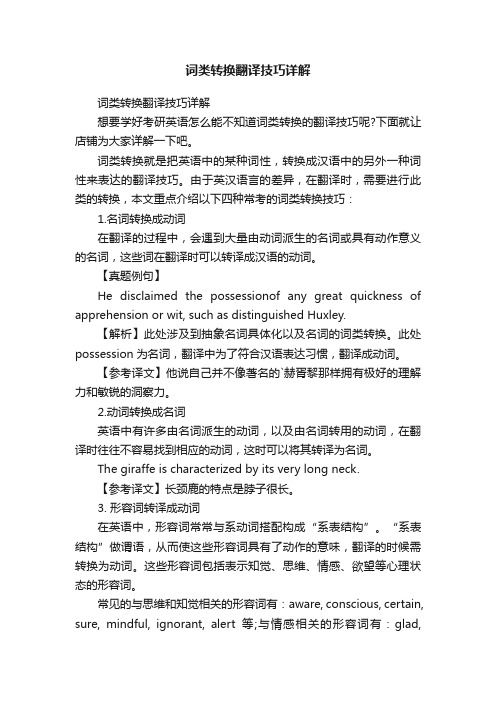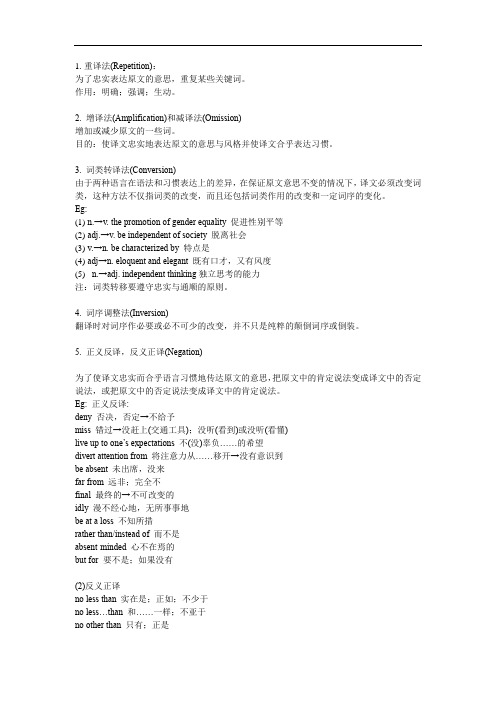2.词类转译法
词类转换翻译法

其他政府活动则是各个州的责任,各州都 有自己的宪法和法律。
其他政府职能则由各个州来承担,各州都有自己的宪法和法 律。
1)由动词派生的名词转译成动词
The government called for the establishment of more technical schools.
政府号召建立更多的技术学校。
设计的目的在于自动操作,调节方便,维护简易, 生产率高。
2.英语动词转译成形容词
He said, if this was the case, he would be tempted to try.
他说,如果情况是这样,他颇有跃跃欲试 之意。
三、形容词的转译 1.形容词转译成动词 英语形容词不少可以转译成动词。这 种形容词大体包括两类:一类主要是由动 词派生或转换而来,大多能引申出动词意 义;另一类多用于表示各种心理状态,而 这些心理状态在汉语中一般用动词表达。
Rockets have found application for the exploration of the universe.
火箭已经被用来探索宇宙。
2) 含有动作意味的名词
Vietnamese War is a drain on American resources.
越南战争不断消耗着美国的资源。
3. 副词转译成名词 有些副词也可以转译成名词。 (1)Aside from offering financial support, a stable job can keep us healthy not only physically but also mentally. 译文:稳定的工作除了能给我们提供财政上的 支持外,还能够使我们保持身心健康。 (2)To be economically prosperous, China will apply more flexible policies of opening to the outside. 译文:为了实现经济繁荣,中国将实行更为灵 活的开放政策。
词类转换翻译技巧详解

词类转换翻译技巧详解词类转换翻译技巧详解想要学好考研英语怎么能不知道词类转换的翻译技巧呢?下面就让店铺为大家详解一下吧。
词类转换就是把英语中的某种词性,转换成汉语中的另外一种词性来表达的翻译技巧。
由于英汉语言的差异,在翻译时,需要进行此类的转换,本文重点介绍以下四种常考的词类转换技巧:1.名词转换成动词在翻译的过程中,会遇到大量由动词派生的名词或具有动作意义的名词,这些词在翻译时可以转译成汉语的动词。
【真题例句】He disclaimed the possessionof any great quickness of apprehension or wit, such as distinguished Huxley.【解析】此处涉及到抽象名词具体化以及名词的词类转换。
此处possession为名词,翻译中为了符合汉语表达习惯,翻译成动词。
【参考译文】他说自己并不像著名的`赫胥黎那样拥有极好的理解力和敏锐的洞察力。
2.动词转换成名词英语中有许多由名词派生的动词,以及由名词转用的动词,在翻译时往往不容易找到相应的动词,这时可以将其转译为名词。
The giraffe is characterized by its very long neck.【参考译文】长颈鹿的特点是脖子很长。
3. 形容词转译成动词在英语中,形容词常常与系动词搭配构成“系表结构”。
“系表结构”做谓语,从而使这些形容词具有了动作的意味,翻译的时候需转换为动词。
这些形容词包括表示知觉、思维、情感、欲望等心理状态的形容词。
常见的与思维和知觉相关的形容词有:aware, conscious, certain, sure, mindful, ignorant, alert等;与情感相关的形容词有:glad,pleased, cautious, careful, angry, happy, exhilarated, excited, confident, thankful, grateful, concerned, eager, afraid, doubtful, sorry等;与欲望相关的形容词有:desirous, hopeful, anxious, keen, enthusiastic, zealous等。
词类转译法

词类转译法(转译为动词) 词类转译法(转译为动词)
…Tom looked his good-bye at the Tom goodgarden. garden 汤姆看了看园子,跟它告别。 He cast a disdainful glance at the prisoner. 他轻蔑地瞄了一眼那个囚犯。 She gives me a joyous grin. 她开心地对我笑了笑。
词类转译法(转译为动词) 词类转译法(转译为动词)
Doctors have said that they are not sure they can save his life. 不敢肯定… Saud was a frustrated man at that time. 沙德那时已受挫折。 I was grateful to John for bringing the books. 非常感谢约翰… The student is not content with his progress.
词类转译法(转译为动词) 词类转译法(转译为动词)
… believed,a successful ban of the trade in opium must be preceded by the destruction of the drug itself. …认为,要成功禁止鸦片买卖,必须得先 把鸦片销毁。 Deng Xiaoping at the 11th Party Congress said,there must be less empty talk and more hard work. 邓小平在“十一大”上说,必须要少说 邓小平在“十一大”上说,必须要少说空 工作。 话,多做工作。
翻译理论与实践
词类转译法 conversion
第5章英汉翻译中的词类转换法

析: 形容词翻译成汉语中的动词的现象是不多见的, 另外,英语形容词往往需要和系动词be相搭配才可以被 转换成汉语中的动词。因此,严格地说,是英语中的 “be+形容词”的系表结构可以被转换成汉语中的动词。 本例中原文are rich in被翻译成汉语中的动词结构“拥 有大量的…”即是典型的例子。
1.具备动态概念的名词转译成动词
The sight of the boy reminds me of this passed father.
看到那个男孩,使我想起来他已故的父亲。 The love of parents for their children is perfect
and minute. 父母爱其子是无微不至的。 An acquaintance of world history is helpful to
译文:他眼角的余光还能瞥见窗外的景色。 这里是工业区,此刻一片萧条景象。
析: 这里将industrial翻译成“工业区”, 将sad翻译成“一片萧条景象”立即使飘忽 不定的东西变得具有可感性。
3. 形容词转译成名词
The voyage was a smooth one. The wind is favorable and the weather fair.
3. 形容词转译成名词
Stevenson was eloquent and elegant but soft. 史蒂文森有口才,有风度,但很软弱。 They were considered insincere. 他们被人认为是伪君子。
4. 名词转译成形容词
The pallor of her face indicated clearly how she was feeling at the moment.
英译汉翻译技巧

1.重译法(Repetition):为了忠实表达原文的意思,重复某些关键词。
作用:明确;强调;生动。
2. 增译法(Amplification)和减译法(Omission)增加或减少原文的一些词。
目的:使译文忠实地表达原文的意思与风格并使译文合乎表达习惯。
3. 词类转译法(Conversion)由于两种语言在语法和习惯表达上的差异,在保证原文意思不变的情况下,译文必须改变词类,这种方法不仅指词类的改变,而且还包括词类作用的改变和一定词序的变化。
Eg:(1)n.→v. the promotion of gender equality 促进性别平等(2)adj.→v. be independent of society 脱离社会(3)v.→n. be characterized by 特点是(4)adj→n. eloquent and elegant 既有口才,又有风度(5)n.→adj. independent thinking独立思考的能力注:词类转移要遵守忠实与通顺的原则。
4. 词序调整法(Inversion)翻译时对词序作必要或必不可少的改变,并不只是纯粹的颠倒词序或倒装。
5. 正义反译,反义正译(Negation)为了使译文忠实而合乎语言习惯地传达原文的意思,把原文中的肯定说法变成译文中的否定说法,或把原文中的否定说法变成译文中的肯定说法。
Eg: 正义反译:deny 否决,否定→不给予miss 错过→没赶上(交通工具);没听(看到)或没听(看懂)live up to one’s expectations 不(没)辜负……的希望divert attention from 将注意力从……移开→没有意识到be absent 未出席,没来far from 远非;完全不final 最终的→不可改变的idly 漫不经心地,无所事事地be at a loss 不知所措rather than/instead of 而不是absent-minded 心不在焉的but for 要不是;如果没有(2)反义正译no less than 实在是;正如;不少于no less…than 和……一样;不亚于no other than 只有;正是none other than (用以加强语气) 正是,恰恰是,不是别人,正是……nothing but 只有(是);只不过no choice but 别无选择,只(好)得unfold 展开,呈现disappear 消失,失踪carelessly 马马虎虎地,粗心地6. 分译法(Division)分译法主要用于长句的翻译。
翻译技巧汇总 词类转译法

7
课堂练习
• 1.He who is subject to temptations tends to err. 2 Talking with his son, the old man was the forgiver of the young man's past wrong doings. 3 He had never been a medical student, yet he was given one of those rare honorary degrees of Doctor of Science.
8
课堂练习参考译文:
• 1.He who is subject to temptations tends to err. 不能抗拒诱惑的人往往要犯错误。 • 2 Talking with his son, the old man was the forgiver of the young man's past wrong doings. 老人在同儿子谈话时宽恕了年轻人过去的种种劣迹。 • 3 He had never been a medical student, yet he was given one of those rare honorary degrees of Doctor of Science 他从来没有上过医学院,但他却获得了理学博士这样难得 的荣誉学位
13
英语名词译成汉语动词时,修饰该名词的形容词往 往转译成汉语副词 • Below 4°C, water is in continuous expansion instead of continuous contraction. • 水在4摄氏度以下就不断地膨胀,而不是不断地收 缩。 • Only when we study their properties can we make better use of the materials. • 只有研究这些材料的特性才能更好地利用它们。
初中汉译英词类转译法的例子
初中汉译英词类转译法的例子一、什么是汉译英词类转译法汉译英词类转译法是在翻译中,将汉语中的词类转换成英语中对应的词类的一种翻译方法。
由于中英两种语言的词类体系存在差异,采用该方法可以更准确地表达原文的意思。
二、例子1:汉语中的名词转译成英语中的动词1.汉语句子:他飞了起来。
英译:He flew up.2.汉语句子:她唱歌跳舞。
英译:She sings and dances.3.汉语句子:他坐了下来。
英译:He sat down.三、例子2:汉语中的动词转译成英语中的名词1.汉语句子:开会的时候,请关掉手机。
英译:Please turn off yourphone during the meeting.2.汉语句子:他在学校读书。
英译:He studies at school.3.汉语句子:请别打扰我。
英译:Please don’t disturb me.四、例子3:汉语中的形容词转译成英语中的副词1.汉语句子:她穿得很漂亮。
英译:She looks very beautiful.2.汉语句子:这件事情做得很好。
英译:This thing is done very well.3.汉语句子:他说得有道理。
英译:He speaks persuasively.五、例子4:汉语中的副词转译成英语中的形容词1.汉语句子:他跑得很快。
英译:He runs very fast.2.汉语句子:她说话听得懂。
英译:Her speech is understandable.3.汉语句子:她笑得很开心。
英译:She laughs happily.六、例子5:汉语中的数词转译成英语中的名词或形容词1.汉语句子:他过了六十岁生日。
英译:He had his 60th birthday.2.汉语句子:我买了十本书。
英译:I bought ten books.3.汉语句子:那个村庄有一千多人。
英译:There are over a thousandpeople in that village.七、例子6:汉语中的量词转译成英语中的of短语1.汉语句子:一杯咖啡英译:a cup of coffee2.汉语句子:一把椅子英译:a chair3.汉语句子:一条狗英译:a dog八、总结汉译英词类转译法是一种有效的翻译方法,特别适用于将中文翻译成英文时,准确表达原文意思。
词类转换翻译法
对未来研究的展望
01 02 03 04
随着语言学和翻译学理论的不断发展,词类转换翻译法的研究也需要 不断深入。
对于不同类型的文本和语言,需要进一步探索如何更有效地应用词类 转换翻译法。
未来的研究可以关注词类转换与其他翻译方法的结合使用,以提高翻 译的质量和效率。
同时,也需要关注机器翻译在词类转换方面的应用,探索如何利用机 器翻译提高翻译的准确性和效率。
在某些情况下,源语言中的某个 词在目标语言中没有完全对应的 词,通过转换词类,可以找到更 贴切的表达方式,提高语义准确 性。
文化传达
词类转换有时是为了更好地传达 原文的文化内涵,使译文更具有当的词类转换可能导致译文可读性降低,给读者带来困惑 。
语义扭曲
过度或不适当的词类转换可能导致原文语义的扭曲或信息的 丢失。
诗歌《静夜思》中的“床前明月光”被翻译 为“The bright moonlight in front of my bed”,而不是“The bright moonlight in front of my bedside”,因为“床前”在中 文中是名词,而在英文中是介词短语,用来
描述月光的位置。
案例二:商务翻译中的词类转换
VS
例如,英文原文“The board approved the decision”可以翻译 为“董事会通过了这项决议”,将英 文中的名词“decision”转换为中文 的动词“通过”。
科技翻译
在科技翻译中,由于涉及大量的专业术语和概念,需要进行准确的词类转换以保证信息的准确传递。例如,将英文中的形容 词转换为中文中的名词,或将中文中的动词转换为英文中的形容词。
例如,英文原文“The material is highly durable”可以翻译为“这种材料非常耐用”,将英文中的形容词“durable”转换为中 文的形容词“耐用的”。
英语翻译之词类转译法
名词→ 转译成动词
再如: Xu Beihong’s paintings of horses are exceptionally good. 原顺序:徐悲鸿的马的画像特别好。 改为:徐悲鸿画马画得特别好。 试译: Insulin is used in the treatment of diabetes. 胰岛素用于治疗糖尿病。 The government called for the establishment of more technical schools. 政府号召建立更多的技术学校。
名词→ 转译成动词
单击此处可添加副标题
英含有动作意思的名词转译成动词。 如:The thought of fat meat makes me sick. 一想到肥肉我就恶心。 A view of the village can be obtained from the tower. 从塔上可以看见这个村庄。 Tom looked his good-bye at the garden. 汤姆看了看园子,跟它告别。
1、英语中很多名词派生的动词或由名词转用的动词,在汉语中往往不易找到合适的动词,这时可以转译成名词。 例:The earth is shaped like a big ball. 地球的形状像个大球。 His speech impressed(使…印象深刻) the audience deeply. 他的演讲给听众的印象很深刻。 Socialist revolution aims (瞄准)at liberating the productive forces. 社会主义革命的目的是为了解放生产力。
英汉翻译中的词类转换技巧
英汉翻译中的词类转换技巧第一篇:英汉翻译中的词类转换技巧英汉翻译中的词类转换技巧翻译考试中英语汉翻译中的词类转换技巧:由于汉语国家和英语国家在历史、文化、风俗习惯等各方面的不同,在语言上形成了很大差异。
有时候一句英文在英美人看来顺理成章,但在中国人看来却是颠三倒四,极为别扭。
很多时候,需要我们对语言中的词类进行转换,然后再翻译,方可使译文显得通顺、自然。
一般来说,词类转译技巧的运用可从以下四个方面加以注意。
1、转译成动词英语中的某些名词、介词、副词,翻译时可转译成汉语中的动词。
The lack of any special excretory system is explained in a similar way.植物没有专门的排泄系统,可用同样的方式加以说明。
(名词转译)As he ran out, he forgot to have his shoes on.他跑出去时,忘记了穿鞋子。
2、转译成名词英语中的某些动词、形容词,翻译时可转换成汉语中的名词。
The earth on which we live is shaped a ball.我们居住的地球,形状象一个大球。
(动词转译)The doctor did his best to cure the sick and the wounded.医生尽了最大的努力来治疗病号和伤员。
(形容词转译)3、转译成形容词英语中有些作表语或宾语的抽象名词,以及某些形容词派生的名词,往往可转译成汉语中的形容词。
另外,当英语动词转译成汉语名词时,原来修饰该动词的副词也往往随之转译成汉语中的形容词。
It is no use employing radar to detect objects in water.使用雷达探测水下目标是没有用的。
(作表语的名词转译)The sun affects tremendously both the mind and body of a man.太阳对人的身体和精神都有极大的影响。
- 1、下载文档前请自行甄别文档内容的完整性,平台不提供额外的编辑、内容补充、找答案等附加服务。
- 2、"仅部分预览"的文档,不可在线预览部分如存在完整性等问题,可反馈申请退款(可完整预览的文档不适用该条件!)。
- 3、如文档侵犯您的权益,请联系客服反馈,我们会尽快为您处理(人工客服工作时间:9:00-18:30)。
Verbs converted into nouns
他总是喝很多酒。 He is a great drinker. 他这个人最爱说话了。 He is a great talker. 他妹妹老是说谎。 His sister is a great liar. 我儿子拉洋车。(老舍:《柳家大院》) My son is a rickshaw puller
1. Conversion into Verbs
1) Nouns converted into verbs
A.The sight and sound of our jet planes
filled me with special longing.
看到我们的喷气式飞机,听见隆隆的机声, 我感到心驰神往。 B. He is a good eater and a good sleeper. 他吃得饱睡得香。
insulation and high resistance to wear. 这些材料的特点是: 绝缘性好,耐磨性 强。
To them, he personified the absolute power.
在他们看来,他就是绝对权力的化身。
2) Adjectives Converted into Nouns
Verbs converted into preps
11点时,他已睡在被窝里。 He was between sheets by eleven. 他用手指在墙上写下了自己的名字。 He wrote down his own name on the wall with his finger. 许多学生反对他。 Many students are against him. 我永远支持你。 Remember that I am always with you.
2)Adverbs Converted into Adjectives
Earthquakes are closely related to faulting.
地震与地层断裂有密切的关系。 It is demonstrated that gases are perfectly elastic. 人们已经证实,气体具有理想的弹性。 He is physically weak but mentally sound. 他身体虽弱,但心智健全。
2) Prepositions Converted into Verbs
Millions of the people in the mountainous
areas are family off poverty. 千百万山区人民终于摆脱了贫穷。 He came to my home for help. 他来到我家,请求帮助。 At noon, she came home for lunch. 中午,她回家吃午饭。 The people are with him. 人民拥护他。
在英译汉的过程中,有些句子可以逐词对 译,有些句子则由于英汉两种语言的表达 式不同,就不能逐词对译。原文中有些词 在译文中需要转换词类,才能使汉语译文 通顺自然。
词类转换就是把英语中的某种词性,转
换成汉语的另外一种词性来表达的翻译 技巧 词性转换:几乎可以在所有词性间进行 名词-----动词, 动词-----名词, 介词-----动词, 副词-----动词, 名词-----形容词
4) Adverbs Converted into Verbs
As he ran out, he forgot to have his shoes on.
他跑出去时,忘记了穿鞋。
When the switch is off, the circuit is open and
electricity doesn’t go through.
3. Conversion into Adjectives
1) Nouns into Adjectives
The pallor of her face indicated clearly how she
was feeling at the moment. 她苍白的脸色清楚地表明了她那时的情绪。 This experiment was a success. 这个实验很成功。 Independent thinking is an absolute necessity in study. 学习中的独立思考是绝对必须的。
当开关断开时,电路就形成开路,电流不能通过。
In this case the temperature in the furnace is up.
这种情况下,炉温就升高。
2. Conversion into Nouns
1) Verbs converted into Nouns
Such materials are characterized by good
Verbs converted into adj.
那个家伙老是滔滔不绝讲个不停。
That fellow is very talkative. 他们迫切地想弄到消息。
They were news-hungry.
Verbs converted into adv.
你们现在得走了。
You must be off now.
They did their best to help the sick and
the wounded. 他们尽了最大的努力帮助病号和伤员。
Both the compounds are acids, the
former is strong, the latter weak. 这两种化合物都是酸,前者是强酸,后者 是弱酸。
The women, with her two daughters,
arrived.
这妇女带着她的两个女儿到了。
He was away before dawn.
他是黎明前出发的。
What are you after? 你追求什么?
3) Adjectives Converted into Verbs
confident, certain, careful, cห้องสมุดไป่ตู้utious, angry, sure,
ignorant, afraid, doubtful, aware, concerned, glad, delighted, sorry, ashamed, thankful, anxious, grateful, able, etc A. Doctors have said that they are not sure they can save his life. 医生说他们不敢肯定能否救得了他的命。 B. The fact that she was able to send a message was a hint. But I had to be cautious. 她能够给我带个信儿这件事就是个暗示。但是我 必须小心谨慎。
他们教导我们要珍惜每一个机会。 They taught us the value of an opportunity. 他长期以来习惯在最后一分钟作出决定。 He has long been used to last-minute decision. 她对他们越来越憎恨。 Her hatred for them grew more.
演出已经开始了。 The performance is on.
Adj. converted into nouns
她非常漂亮。 She is a real beauty.
那个家伙笨得出奇。
That fellow is a typical fool. 你说他傻不傻? Don’t you think he’s an idiot?
